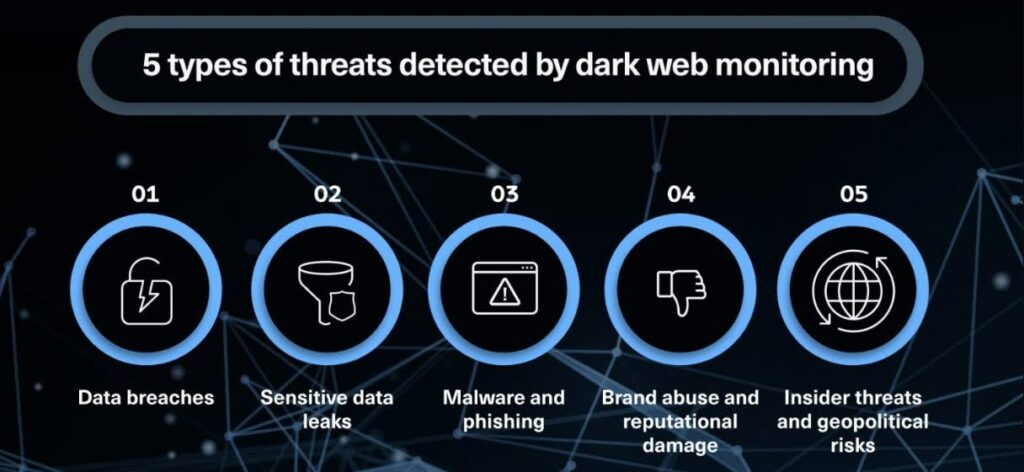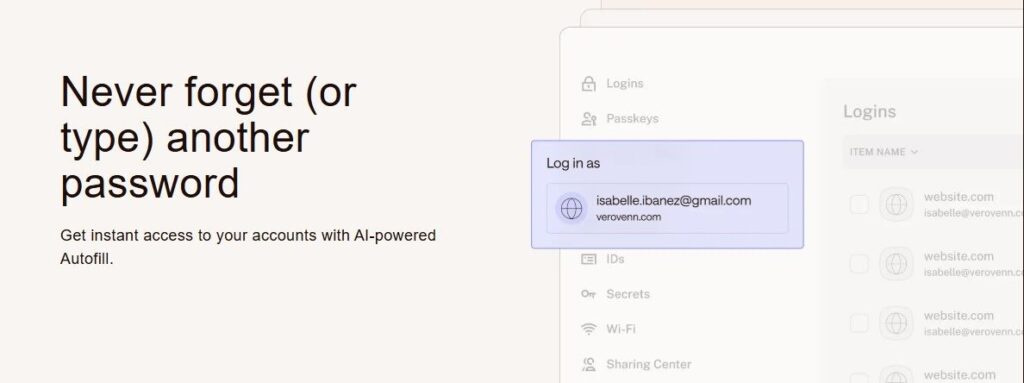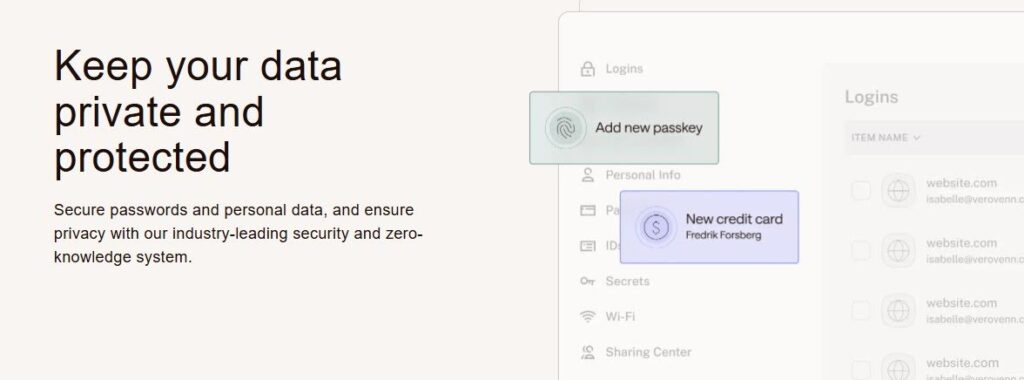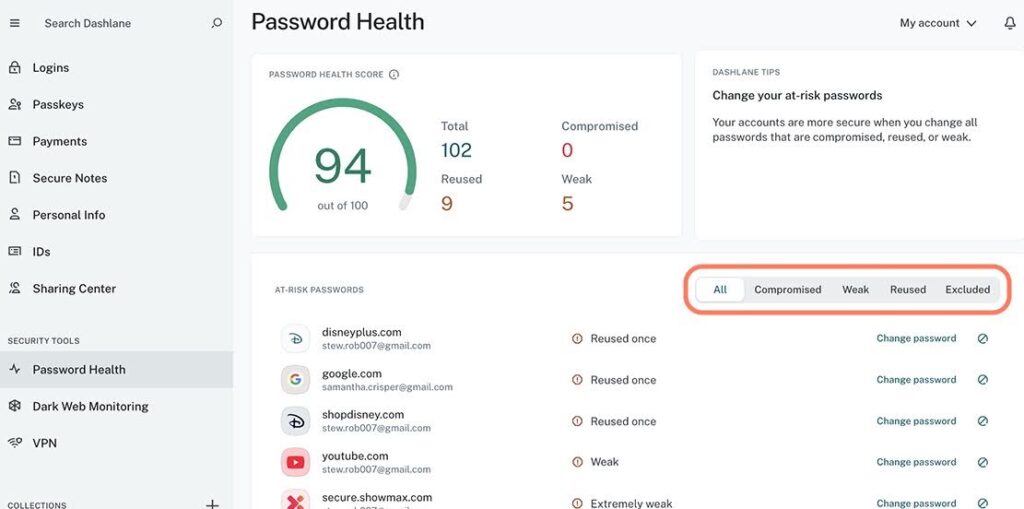Password managers have become an essential tool for both personal and professional security. With cyberattacks on the rise, relying on memory, sticky notes, or browser autofill just isn’t enough anymore. If you’re running a business, managing multiple accounts, or even just safeguarding your personal data, you need a reliable solution.
That’s where Dashlane comes in. Long considered one of the “big three” alongside LastPass and 1Password, Dashlane has built a reputation for security, user-friendly design, and unique features like Dark Web Monitoring. But with growing competition from Bitwarden, NordPass, and others, is Dashlane still a top pick in 2025?
By the end of this article, you’ll know whether Dashlane is the right password manager for you, or if another option is a better fit.
Highlights
- Dashlane remains one of the most secure password managers in 2025, using AES-256 encryption, a zero-knowledge architecture, and strong 2FA and biometric login options.
- Unique features like a built-in VPN, automatic password changer, and Dark Web Monitoring set Dashlane apart from competitors like LastPass, 1Password, and Bitwarden.
- Password Health Reports and sharing tools help individuals, families, and businesses maintain strong, unique credentials and securely share access.
- Business and enterprise plans include admin controls, SSO, SCIM integrations, and compliance-friendly reporting, making Dashlane a strong choice for SMBs and teams.
- While more expensive than some alternatives, Dashlane’s all-in-one convenience, proactive breach detection, and user-friendly design make it one of the best password managers available today.
Dashlane review: Security model and encryption
When it comes to password managers, security isn’t just important—it’s everything.
Zero-knowledge architecture

Dashlane follows a zero-knowledge architecture, which is the gold standard for password managers. This means that only you can access your stored credentials, not Dashlane, not hackers, and not even government agencies requesting access.
Here’s how it works in practice:
- Master Password stays local: Your master password is never transmitted to Dashlane’s servers. It exists only on your device and is the sole key to unlocking your vault.
- End-to-end encryption: Every piece of data (e.g., logins, payment details, secure notes) is encrypted on your device before it is sent to the cloud for sync. The servers only ever see encrypted blobs of data, not readable text.
- No backdoors: Because Dashlane doesn’t know your master password or hold decryption keys, there’s no backdoor for hackers (or even Dashlane itself) to access your vault.
- Zero-knowledge backups: Even when you sync across devices, the decryption only happens locally. For example, if you log in on your phone, Dashlane decrypts your data using your master password or biometrics on the device itself.
Why does this matter? Many users still assume that using a password manager means “trusting the company with your passwords.” With zero-knowledge, you’re not handing over trust. You’re keeping it. The service is just providing the encrypted storage and syncing mechanism, while you retain control of the keys.
For businesses, this architecture also ensures compliance with strict security frameworks like GDPR, HIPAA, and SOC 2. It means employees’ data isn’t vulnerable to insider threats or subpoenas, and company-wide policies can be enforced without compromising privacy.
👉 Bottom line: Dashlane’s zero-knowledge encryption model ensures protection even in the event of a breach. The attackers would get nothing but useless, scrambled data.
Encryption standards
Behind Dashlane’s zero-knowledge design is a powerful encryption system that keeps your data out of reach from attackers. In 2025, Dashlane continues to rely on AES-256 encryption, which is widely recognized as the strongest encryption method available for consumer-grade applications. This is the same standard trusted by banks, government agencies, and military organizations worldwide.
Here’s what makes Dashlane’s encryption so robust:
- AES-256 (Advanced Encryption Standard): AES uses symmetric key encryption, meaning the same key encrypts and decrypts your data. With a 256-bit key length, there are more possible combinations than atoms in the observable universe. In short, it’s virtually impossible to crack with brute force.
- PBKDF2 key stretching: To prevent hackers from guessing your master password through brute force or dictionary attacks, Dashlane applies PBKDF2 (Password-Based Key Derivation Function 2). This process adds thousands of computational iterations to every login attempt, making each guess time-consuming and resource-intensive.
- SHA-2 hashing: Dashlane combines AES-256 with SHA-2 hashing algorithms for integrity checks. This ensures that even if an attacker intercepted your data, they couldn’t modify or manipulate it without detection.
- End-to-end encryption for syncing: Whether you’re syncing between your laptop, phone, or browser extension, all data is encrypted before it leaves your device and decrypted only when it reaches another authorized device.
What does this mean in practical terms? Even if Dashlane’s servers were compromised tomorrow, hackers would only see random gibberish. They would have no way to translate the strings of encrypted data back into useful information without your unique master password.
For businesses and enterprise teams, this level of encryption is crucial for compliance with data protection regulations like GDPR and HIPAA. It ensures customer, employee, or patient data remains secure, even in the worst-case scenario of a cloud breach.
👉 Bottom line: Dashlane’s use of AES-256-bit encryption, PBKDF2, and SHA-2 hashing creates a multi-layered security shield that protects against brute force, interception, and tampering. So you can enjoy peace of mind whether you’re storing one password or thousands.
Biometric and 2FA support

Even with strong encryption, the biggest vulnerability in any password manager is usually the person using it. That’s why Dashlane layers biometric logins and two-factor authentication (2FA) on top of your master password.
Biometric authentication
On mobile devices, Dashlane integrates with your phone’s built-in security features:
- Face ID (iOS)
- Touch ID (iOS and macOS)
- Fingerprint sensors (Android and Windows Hello)
This means you can log in with your face or fingerprint instead of typing your master password every time. It’s not just convenient, it also reduces the chance of phishing or shoulder surfing.
Two-factor authentication (2FA)
Dashlane also supports two-factor authentication, giving you an additional layer of protection. Even if your master password were stolen, a thief couldn’t access your vault without the second factor. Options include:
- TOTP apps: Google Authenticator, Authy, and similar apps generate time-based codes you enter at login.
- Hardware security keys: Dashlane supports physical keys like YubiKey via the FIDO U2F standard. These keys are considered one of the most secure forms of 2FA because they can’t be phished or intercepted.
- Biometrics as 2FA: On devices with strong secure enclaves (like iPhones), biometrics can serve as a second factor tied to the device itself.
Why it matters
Adding biometrics and 2FA reduces the risk of account compromise dramatically. A hacker would need your master password + your fingerprint or face + access to your phone or security key. That combination makes unauthorized access nearly impossible.
For businesses, this feature also supports compliance with modern security policies that increasingly require multi-factor authentication for critical tools.
👉 Bottom line: With support for biometrics, TOTP apps, and hardware keys, Dashlane ensures your vault is protected by multiple layers of defense, not just one password.
Dark Web monitoring

Even with strong encryption and airtight logins, data breaches can still happen. That’s why Dashlane includes Dark Web monitoring, a proactive security feature designed to catch compromised credentials before hackers can exploit them.
How it works
Dashlane continuously scans a massive database of leaked credentials, stolen account details, and exposed information floating around in underground forums and marketplaces on the dark web. When you add an email address to your Dashlane account, the system automatically checks for:
- Breached logins linked to your email address
- Exposed passwords that have appeared in past data dumps
- Personal information leaks (like phone numbers or payment details)
If anything suspicious is found, Dashlane alerts you immediately and recommends steps to secure your account. The first of which is usually to generate a new, stronger password inside the vault.
Real-world value
Consider this: in 2023 alone, over 5 billion records were compromised in global data breaches (Source: ITGovernance). Even if you use a password manager to generate strong, unique credentials, a site you signed up for years ago could be hacked without your knowledge. Without monitoring, you might not know until your account is taken over.
With Dashlane’s Dark Web Monitoring, you get an early warning. For example:
- If your old email/password combo from a forum leak shows up online, Dashlane alerts you so you can change it before it’s used in a credential-stuffing attack.
- Businesses can protect employee accounts at scale by monitoring multiple email addresses, reducing the risk of unauthorized access.
What sets Dashlane apart
Some competitors, like 1Password, offer “watchtower” features that alert you to weak or reused passwords. But Dashlane takes it a step further by actively scanning the dark web for your information in real time. Combined with the automatic password changer, this creates a closed security loop: find the breach, fix the issue, move on.

👉 Bottom line: Dark Web Monitoring is like having a personal security guard scanning the internet for your data leaks. It’s not just about storing your passwords safely. It’s about staying one step ahead of attackers.
Verdict on security: With its zero-knowledge model, AES-256 encryption, robust biometric and 2FA options, and proactive Dark Web Monitoring, Dashlane remains one of the most secure password managers on the market in 2025.
Dashlane review: TL;DR—Pros and cons of Dashlane
If you want a quick rundown of the good and the bad when it comes to using Dashlane for password management, here it is:
| Pros | Cons |
| Strong zero-knowledge security | Web-first approach may not appeal to all users |
| Business-friendly features | More expensive than some competitors |
| Built-in VPN included | VPN is basic compared to standalone providers |
| Excellent user interface and autofill | Limited free plan (25 passwords, one device) |
| Dark Web Monitoring alerts | |
| Automatic password changer | |
| AES-256 encryption with 2FA support |
For a more detailed breakdown of Dashlane’s features, how it compares to its competitors, and who Dashlane suits best, read on!
Dashlane review: Features overview
While security is the foundation of any password manager, the extra features are what set Dashlane apart from the competition. In 2025, it continues to be one of the most feature-rich tools available, with a mix of essentials and unique add-ons that improve both personal and business use.
1. Password vault and autofill

At its core, Dashlane is a secure password vault that stores unlimited logins, syncs them across devices, and makes them instantly accessible when you need them. Autofill is smooth and reliable, working across browsers and apps to handle:
- Personal information like addresses or phone numbers
- Website logins (usernames and passwords)
- Payment details for faster checkout
Unlike some password managers that struggle with autofill accuracy, Dashlane has consistently been one of the most reliable. In side-by-side comparisons with LastPass and Bitwarden, its autofill rarely fails to detect fields or enter incorrect data.
2. Secure notes and ID storage

Beyond passwords, Dashlane allows you to store sensitive documents and notes securely. Examples include:
- Passport numbers or scans for travel
- Software license keys
- Wi-Fi passwords
- Tax documents
Each entry benefits from the same AES-256 encryption that protects your vault. For professionals and businesses, this feature is particularly useful for securely storing and sharing non-login credentials.
3. Built-in VPN

One of Dashlane’s biggest differentiators is its integrated VPN, powered by Hotspot Shield. While it’s not as advanced as standalone VPNs like NordVPN or ExpressVPN, it’s a convenient option for:
- Securing public Wi-Fi in airports, cafes, or hotels
- Hiding your IP address when working remotely
- Encrypting internet traffic to prevent snooping
For casual users who don’t want to pay for an additional VPN subscription, this feature adds real value.
4. Password health reports

Dashlane includes a Password Health checker that continuously evaluates the strength of your stored credentials. It highlights:
- Reused credentials across different sites
- Compromised accounts from breaches
- Weak or guessable passwords
It then assigns you a Password Health Score, giving you an at-a-glance metric for your overall security posture. Businesses can use these reports to ensure employees follow password hygiene standards across the company.
5. Automatic password changer
This is one of Dashlane’s most unique features and something very few competitors offer. With the Automatic Password Changer, you can instantly reset weak or compromised passwords across supported websites with a single click.
To use this feature, you’ll need to be logged into the Dashlane Smart Extension.
For example, if your X password is flagged as compromised, Dashlane can automatically generate and apply a new, strong password without requiring you to manually log in and update settings.

After resetting your password, the pop-up will ask you if you’d like to update your Dashlane vault with the new password as well. Select which Dashlane account you’d like to update, and that’s it.
While the feature doesn’t support every site on the web, the list of compatible platforms continues to grow, covering many of the most common services people use daily.
6. Sharing center

Dashlane includes a secure password-sharing system that allows you to share logins or secure notes with other people, without ever revealing the actual password. Permissions can be set as “limited” (for use only) or “full rights” (allowing edits or revocations).
For families and small businesses, this is invaluable. Instead of emailing or messaging passwords, which is extremely insecure, you can share them directly inside Dashlane with end-to-end encryption intact.
Learn more about secure sharing for Friends & Family and Business plans in Dashlane Support.
7. Business and team features
Dashlane isn’t just for personal use. Its business and enterprise plans offer powerful tools for team security, including:
- Admin Console: Manage users, assign roles, and monitor security activity.
- Policy Enforcement: Require employees to use strong, unique passwords.
- SSO and SCIM integrations: Simplify onboarding and offboarding of staff.
- Audit Logs and Reporting: Track password health and compliance across the organization.
These features make Dashlane especially appealing for small-to-medium businesses (SMBs) that want enterprise-grade protection without the complexity of larger platforms.
8. Cross-platform sync

Dashlane offers seamless syncing across devices, including desktop, mobile, and browser extensions. This means if you add or update a login on your phone, it’s instantly available on your laptop or tablet. Unlike some free-tier competitors that limit syncing to a single device, Dashlane’s premium plans offer unlimited cross-device sync.
Ease of use and user experience

Dashlane’s interface is sleek, modern, and easy to navigate.
- Web-first approach: In 2021, Dashlane shifted from a desktop app to a web-first platform. Today, the web app is polished and highly responsive, making setup simple.
- Browser extensions: Chrome, Firefox, Safari, and Edge extensions work smoothly.
- Mobile apps: Available for iOS and Android, Dashlane’s mobile apps mirror the web version and are intuitive, with seamless biometric login.
Compared to LastPass (which can feel clunky at times), Dashlane offers one of the best user experiences in the category. In fact, “ease of use” is the top benefit cited by users who reviewed it for G2 (Source: G2)
Pricing: How much does Dashlane cost in 2025?
Dashlane’s pricing is slightly higher than some competitors, but it also offers features others don’t. Here’s a breakdown of Dashlane’s plans and pricing.
| Plan | Price (Annual) | Features |
| Free | $0 | 25 passwords, 1 device |
| Advanced | $2.75 per month | Unlimited passwords, Dark Web Monitoring |
| Premium | $4.99 per month | VPN, password sharing, password health |
| Friends & Family | $7.49 per month | 10 Premium accounts |
| Business | $8 per month per user | Admin console, SSO, provisioning |
| Enterprise | Custom pricing | Advanced security integrations |
👉 Note: Pricing may vary slightly by region.
While Bitwarden offers a cheaper premium plan, Dashlane’s VPN and password changer add real value, especially for non-technical users who want an all-in-one solution.
Dashlane vs. competitors (2025 edition)
Here’s a head-to-head comparison of Dashlane and the top password managers of 2025: LastPass, 1Password, and Bitwarden.
Dashlane vs. LastPass
- Security: Both use zero-knowledge architecture, but LastPass has suffered security breaches, while Dashlane has not.
- Features: Dashlane includes a VPN and an automatic password changer. LastPass doesn’t.
- Pricing: LastPass is slightly cheaper.
Dashlane vs. 1Password
- User Experience: Dashlane’s web-first interface is more streamlined, while 1Password still uses native apps.
- Features: 1Password lacks a built-in VPN and password changer.
- Business Use: 1Password is stronger for enterprise features like Secrets Management.
Dashlane vs. Bitwarden
- Pricing: Bitwarden is cheaper and open-source.
- Features: Dashlane has extras like VPN and a password changer.
- Trust Factor: Bitwarden appeals to open-source advocates, while Dashlane caters to users wanting simplicity.
Who should use Dashlane?
Dashlane may not be for everyone, but it’s certainly an excellent choice for some. The following groups will find the most value from using Dashlane as their password manager.
- Freelancers and entrepreneurs: Manage multiple accounts with ease, with security reports to keep credentials strong.
- Small businesses: Admin features, team sharing, and monitoring help enforce security policies.
- Families: The Friends & Family plan provides affordable coverage for up to 10 users.
- Security-conscious individuals: Extra features like VPN and password changer make it a solid all-in-one choice.
Dashlane review: Final verdict
Yes. Dashlane remains one of the best password managers available in 2025.
While it’s more expensive than Bitwarden and LastPass, Dashlane’s combination of security, user-friendly design, and extra features like VPN, password changer, and Dark Web Monitoring justify the price.
If you’re a business owner, freelancer, or family looking for an all-in-one password manager that emphasizes both security and convenience, Dashlane is hard to beat.For users who want a cheaper, open-source alternative, Bitwarden is a great option. For enterprise-level integrations, 1Password may take the lead. But for most individuals and SMBs, Dashlane is still a top choice.
